The Indian government has launched a lot of initiatives and done a lot of things to support MSMEs. MSMEs are essential to the economic growth of our country. MSME can now access financing through several lending schemes designed by the Indian government, in addition to loans from banks and other financial institutions. The well-known MSME loan schemes of 2020 that became well-known as a result of COVID-19 upsetting trade are covered in the sections that follow.
Pradhan Mantri Mudra Yojana (PMMY)
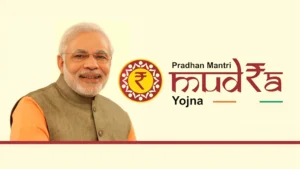 Under PMMY, the MSME loan scheme falls under the category of MUDRA (Micro Units Development and Refinance Agency Limited) loans. MUDRA is a non-banking financial company (NBFC) that aids in MSMEs’ growth. In order to assist banks, microfinance institutions (MFIs), and non-bank financial institutions (NBFC) in providing money to micro units with loan requirements up to Rs. 10 lakhs, MUDRA refinances their loans. MFIs, NBFCs, Small Finance Banks, and Commercial Banks are the lenders offering the loans under this program. The PMMY scheme comprises three distinct schemes, namely “Shishu,” “Kishore,” and “Tarun.” These schemes denote the developmental or growth stage and funding requirements of the micro-units or entrepreneurs that receive the benefits.
Under PMMY, the MSME loan scheme falls under the category of MUDRA (Micro Units Development and Refinance Agency Limited) loans. MUDRA is a non-banking financial company (NBFC) that aids in MSMEs’ growth. In order to assist banks, microfinance institutions (MFIs), and non-bank financial institutions (NBFC) in providing money to micro units with loan requirements up to Rs. 10 lakhs, MUDRA refinances their loans. MFIs, NBFCs, Small Finance Banks, and Commercial Banks are the lenders offering the loans under this program. The PMMY scheme comprises three distinct schemes, namely “Shishu,” “Kishore,” and “Tarun.” These schemes denote the developmental or growth stage and funding requirements of the micro-units or entrepreneurs that receive the benefits.
Nature of Assistance – ‘Shishu” offers loans up to a Rs. 50,000 limit. Loans beyond Rs. 50,000 up to Rs. 5 lakhs are offered by “Kishor.” “Tarun” offers micro-unit loans beyond Rs. 5 lakhs up to Rs. 10 lakhs.
Prime Minister’s Employment Generation Programme (PMEGP)
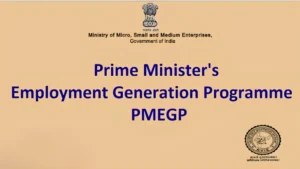
The goal of the MSME loan scheme is to use micro business enterprises in the non-farm sector to create possibilities for traditional craftspeople and unemployed youngsters to work for themselves. The Khadi and Village Industries Commission (KVIC), which serves as the scheme’s national nodal agency, is in charge of carrying it out. State KVIC Directorates, District Industries Centers (DICs), State Khadi and Village Industries Boards (KVIBs), and banks are the entities that carry out the implementation of this plan at the state level. The government subsidy is routed through approved banks by the KVIC under this program, and the entrepreneurs or recipients receive the funds straight into their bank accounts.
Nature of Assistance – The maximum project or unit cost that falls within the purview of this program is Rs. 10 lakhs for the business or service sector and Rs. 25 lakhs for the manufacturing sector. In urban regions, the beneficiary rate of the subsidiary for the general category is 15%, whereas in rural areas, it is 25%. In metropolitan areas, the subsidiary’s beneficiary rate falls to 25%, while in rural areas, it is 35%.
Credit Guarantee Trust Fund for Micro & Small Enterprises (CGTMSE)
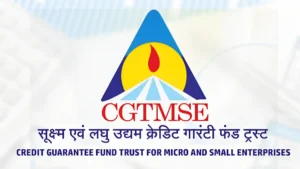 The Credit Guarantee Fund Trust for Micro and Small Enterprises (CGTMSE) was founded by the Ministry of Micro, Small, and Medium Enterprises in collaboration with the Small Industries Development Bank of India (SIDBI). To put into effect a credit guarantee program for MSMEs, CGTMSE was founded. The entire purpose of this trust is to support small and medium-sized businesses financially, without requiring any collateral or guarantees from outside parties.
The Credit Guarantee Fund Trust for Micro and Small Enterprises (CGTMSE) was founded by the Ministry of Micro, Small, and Medium Enterprises in collaboration with the Small Industries Development Bank of India (SIDBI). To put into effect a credit guarantee program for MSMEs, CGTMSE was founded. The entire purpose of this trust is to support small and medium-sized businesses financially, without requiring any collateral or guarantees from outside parties.
Nature of Assistance – The scheme offers guarantee coverage equal to 50%, 75%, 80%, or 85% of the credit facility’s approved amount. The level of guarantee protection is 85% for microenterprises up to 5 lakhs. The guarantee cover amounts to half of the loan facility’s approved amount, which ranges from 10 lakhs to 100 lakhs per MSME borrower for retail trade activities.
Credit Linked Capital Subsidy Scheme (CLCSS)
 MSMEs are provided with a subsidy for technological upgrades through the Credit Linked Capital Subsidy Scheme (CLCSS). Under this initiative, MSMEs can upgrade their technology for up to Rs. 1 crore with a 15% rebate on further expenditure. To receive the subsidy under this system, candidates who meet the qualifying requirements may speak with any one of the 12 nodal banks or organizations.
MSMEs are provided with a subsidy for technological upgrades through the Credit Linked Capital Subsidy Scheme (CLCSS). Under this initiative, MSMEs can upgrade their technology for up to Rs. 1 crore with a 15% rebate on further expenditure. To receive the subsidy under this system, candidates who meet the qualifying requirements may speak with any one of the 12 nodal banks or organizations.
Nature of Assistance – With the help of this initiative, MSME Loan can upgrade their technology more easily by receiving a 15% upfront capital subsidy on any institutional financing they obtain. For specific sectors, subsectors, and technologies, An upfront 15% discount on institutional financing up to Rs. 1 crore (i.e., a maximum subsidy of Rs. 15 lakh) is provided by this project.
Equity Infusion for MSMEs through Fund of Funds
MSMEs struggle with a serious lack of equity. Early-stage funding is provided by venture capital (VC) and private equity (PE) organizations; growth-stage finance is provided by very few of these entities. MSMEs with development potential and viability can apply for equity capital from the Fund of Funds, which encourages MSMEs to expand and list on stock exchanges. With government participation, this program will be able to bridge various forms of funding into underserved MSMEs and meet the expanding demands of high-growth, viable MSMEs.
Nature of Assistance – In order to accomplish its growth objectives, the Indian government would assist venture capital (VC) or private equity (PE) businesses in making investments in MSMEs that are financially viable. The planned fund of funds will promote leveraged private sector investments of Rs. 50,000 crore in MSME.
Credit Guarantee Scheme for Subordinate Debt (CGSSD)
 The goal of the Credit Guarantee Scheme for Subordinate Debt (CGSSD) is to assist the owners of financially troubled MSMEs that, as of April 30, 2020, are non-performing assets (NPAs). In turn, the promoters will inject this sum as equity into the MSME Loan business, boosting liquidity and preserving the debt-to-equity ratio. Credit equivalent to 15% of the MSMEs’ total equity plus debt, or Rs. 75 lakh, would be awarded to the promoters.
The goal of the Credit Guarantee Scheme for Subordinate Debt (CGSSD) is to assist the owners of financially troubled MSMEs that, as of April 30, 2020, are non-performing assets (NPAs). In turn, the promoters will inject this sum as equity into the MSME Loan business, boosting liquidity and preserving the debt-to-equity ratio. Credit equivalent to 15% of the MSMEs’ total equity plus debt, or Rs. 75 lakh, would be awarded to the promoters.
Nature of Assistance – The sub-debt is guaranteed 90% by the program, with the concerned promoters contributing the remaining 10%. Ten years is the maximum repayment period. There is a seven-year moratorium on principal payments.
SIDBI Make In India Loan For Enterprises (SMILE)
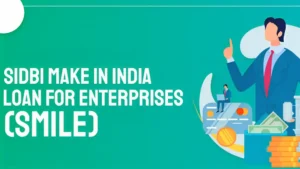 In order to support MSMEs in participating in the Government of India’s “Make in India” drive, SIDBI Make In India Loan For Enterprises (SMILE) was created. With this plan, you can get a quasi-equity soft loan. Additionally, it offers MSME loans term with somewhat lenient terms to help them achieve the debt-to-equity ratio needed to open for business. Additionally, it offers loans to already-established MSMEs so they can take advantage of development prospects.
In order to support MSMEs in participating in the Government of India’s “Make in India” drive, SIDBI Make In India Loan For Enterprises (SMILE) was created. With this plan, you can get a quasi-equity soft loan. Additionally, it offers MSME loans term with somewhat lenient terms to help them achieve the debt-to-equity ratio needed to open for business. Additionally, it offers loans to already-established MSMEs so they can take advantage of development prospects.
Nature of Assistance – For financing and equipment, a loan of at least Rs. 10 lakh is required. For others, a loan of at least Rs. 25 lakh is required. With a maximum 36-month moratorium, the payback duration is up to ten years.
MSME Loan for Business Startups in 59 Minutes
Recently, the Indian government stated that it will provide MSME Business Loans for Startups in 59 Minutes. In order to deliver MSME Loan in 59 minutes, a new website was introduced. The goal of the MSME loan scheme is to digitalize and automate the many business loan processes that are provided, such as term loans, working capital loans, and mudra loans.
Nature of Assistance – Approvals for business loans in principle range from Rs. 1 lakh to Rs. 5 crores. Collateral is not required for loan approval. Starting at 8.5%, there is an interest rate. Mudra loan approvals in principle range from Rs. 10,000 to Rs. 10 lakh.
MSME Loan Scheme by Banks
MSME Loan can apply for term loans and working capital loans from banks and other lending institutions. The working capital loans offered to MSMEs can apply for working capital and term loans from banks and other lending organizations. Banks provide working capital loans to MSMEs in order to help them meet their daily cash needs. MSME Loan can use the term loans to finance fixed asset purchases, capital expenditures, or capital expansion.
In addition to working capital and term loans, banks and other financial institutions provide MSMEs with a variety of loan programs. The terms and conditions that apply to the various banks and financial institutions’ MSME loan programs vary. The interest rates associated with each loan program that banks and other financial institutions offer vary.
Banks give a lot of MSME loans without any collateral. Axis Bank, HDFC Bank, ICICI Bank, State Bank of India, and other banks are among those that provide various loan plans. Among the financial institutions that lend money to MSMEs are NBFCs, Micro Finance Institutions, Small Finance Banks (SFBs), and Regional Rural Banks (RRBs).

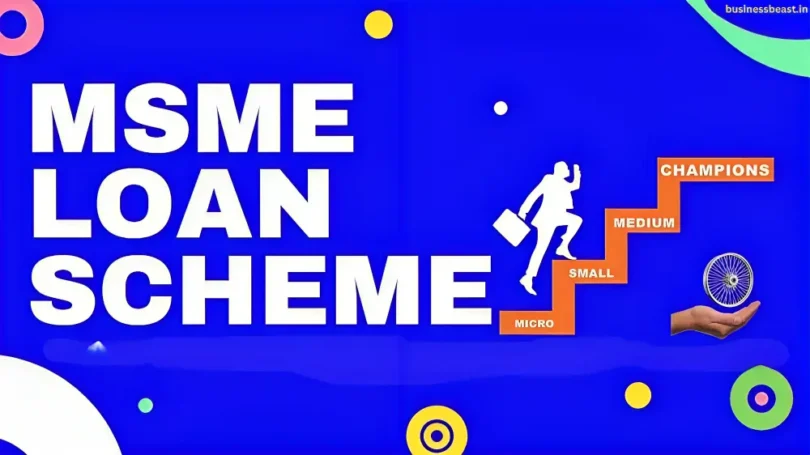






Leave a Comment